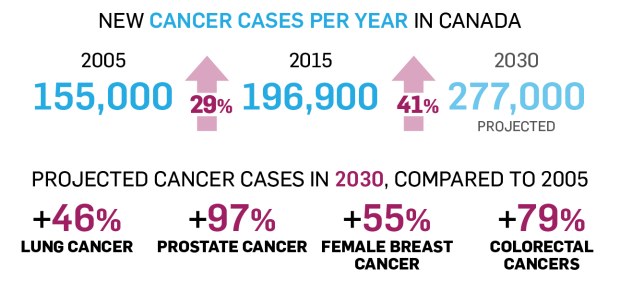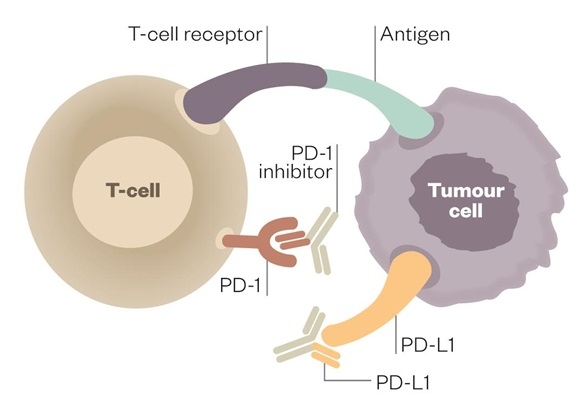Doctors and Researchers at the Princess Margaret Cancer Centre, Toronto have been fighting a long battle with cancer for decades and coming up with new breakthroughs in cancer cure. The conventional choice for cancer care have always been radiation, chemotherapy or surgery till now, but the
risks and side effects that follow these line of therapies can be enervating.
The recent advances in cancer immunology are reviving hope among patients and defining new approaches to treat cancer. Researchers at Princess Margaret’s
Tumor Immunotherapy Program, are looking for fresh ways to boost our immune systems to recognize and isolate cancerous cells and kill them just the way antibodies attack antigens. Dr. Pamela Ohashi, the Director of the Tumor Immunotherapy Program, Dr. Marcus Butler, Director of Immune Monitoring Laboratory and their team of researchers are conducting extensive research on
immunotherapy as an emerging treatment for cancer. They have successfully produced results that are likely to alter the course of cancer care in Canada.
 What is Immunotherapy?
What is Immunotherapy?
Immunotherapy is a type of cancer treatment designed to fight cancer by equipping the body with the required strength and tools. It has been observed that our body can recognize the cancerous cells and an empowered immune system effectively destroys these cells. It specifically targets tumors and limits side effects in patients, as opposed to chemotherapy. It is also a viable approach to fight cancer as it involves close monitoring and long-term observation, to ensure there is no relapse.
Immunotherapy while not being an alien path for physicians however has not been tapped to its full potential as it is only during the last two decades that researchers have understood the working of our immune system better. Immunotherapy involves treatments like using anti-PD1 drugs,
adoptive T-cell therapy, monoclonal antibodies and oncolytic viral therapy. PD1 is a regulating protein that blocks the activation of T-cells in our body, that are naturally induced to identify and kill cancer cells. Clinical trials have shown that anti-PD1 drugs block the PD1 protein and activate the T-cells.
Anti-PD1 drugs are being recommended as the first line of treatment for those suffering from lung and skin cancer by oncologists. One particularly inspiring case was a patient admitted with a Stage 4 melanoma at Princess Margaret for a clinical trial using antiPD1 drugs and successfully treated.
 Dr. Pamela Ohashi
Dr. Pamela Ohashi, and her team developed Adoptive T-cell Therapy, a specific immunotherapy, wherein cancer fighting T-cells are extracted from a patient’s tumor and put on growth supplements which help them to multiply rapidly. The activated T- cells when transferred back to the patient are tumor specific and trigger a stronger response against the tumor from which they are isolated. Although T-cells are capable of attacking the cancerous cells, the count is usually low and this technique helps in building a large army of T-cells to combat the cancerous ones. Current trials involving T-cell therapy are in Phase 1 and 2 involving patients with metastatic melanomas.
Dr. Butler is currently working on a clinical trial on the dose escalation of the
drug MEDI4736, that contains monoclonal antibodies and has shown promise in treating solid tumors. Monoclonal antibodies are engineered to mimic natural antibodies and attach to defective cancer cells which helps the immune system to distinguish and kill the cancerous cells. The trial is in its first phase and is being done on patients with advanced cancer.
Monoclonal antibody therapy however is still in the experimental stage and hence reserved for people in the advanced stage for whom conventional treatments have not worked.
The research team is figuring out ways to ensure everyone benefits from the program. So far, in the clinical trials conducted only 1/3rd of the patients have responded to treatment without exhibiting any chances of relapse. Response to treatment differs from patient to patient. Doctors however are positive that immunotherapy will effectively treat all cancers in the near future. The researchers and physicians at the centre are developing new line of treatments, which you can avail through clinical trials. For more information on clinical trials at the centre
click here.

 What is Immunotherapy?
What is Immunotherapy?
 Dr. Pamela Ohashi, and her team developed Adoptive T-cell Therapy, a specific immunotherapy, wherein cancer fighting T-cells are extracted from a patient’s tumor and put on growth supplements which help them to multiply rapidly. The activated T- cells when transferred back to the patient are tumor specific and trigger a stronger response against the tumor from which they are isolated. Although T-cells are capable of attacking the cancerous cells, the count is usually low and this technique helps in building a large army of T-cells to combat the cancerous ones. Current trials involving T-cell therapy are in Phase 1 and 2 involving patients with metastatic melanomas.
Dr. Pamela Ohashi, and her team developed Adoptive T-cell Therapy, a specific immunotherapy, wherein cancer fighting T-cells are extracted from a patient’s tumor and put on growth supplements which help them to multiply rapidly. The activated T- cells when transferred back to the patient are tumor specific and trigger a stronger response against the tumor from which they are isolated. Although T-cells are capable of attacking the cancerous cells, the count is usually low and this technique helps in building a large army of T-cells to combat the cancerous ones. Current trials involving T-cell therapy are in Phase 1 and 2 involving patients with metastatic melanomas.